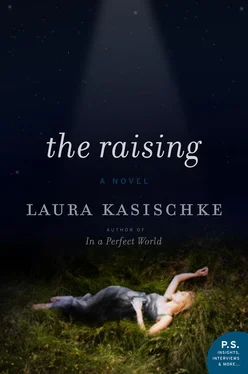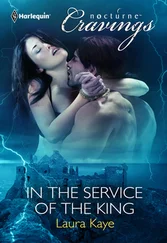“You know,” he told her, not looking over at Perry, “I feel like being honest with you. I don’t keep the DNA just for identification—because, honestly, how often does this happen. I mean, as I’ve said, it happens, but not frequently enough to warrant the trouble of keeping the kinds of records I have. You know, it occurred to me when I first heard about the military project: ah-ha, they have a plan .”
Professor Polson nodded, and he took a breath.
“DNA can replicate itself, of course, and how many years away are we, really, from learning how to build a human being, a clone, if you will, a replica from only the most microscopic sample? I thought to myself, this is how they’ll raise their armies in the future, now that American boys are getting so soft. Why, even my own sons—don’t get me started! There’s no way those boys could save our butts in a war. We’re not raising real men anymore in this country, and the military knows this. No. They’ve saved the DNA of the military elite, the fighting machines. They will raise their armies out of those as needed.
“And I thought, shouldn’t my dead have the same advantages? They may not have died heroes, most of them, but a mortician feels an affection for his dead, and, I’ve felt that, as the last one to whom their care had been entrusted, I owed them the possibility of this raising. Certainly their families were in too much shock and pain to take care of details like this. Plus, it only takes a few seconds. The cards are small. I’ve only filled one file drawer so far.”
Professor Polson’s mouth was open, but she said nothing. She blinked, seeming astonished, speechless.
“But!” Mr. Dientz said, “in the meantime, I have what we need to solve this mystery!” There was more color in Mr. Dientz’s face then than there had been even when he was discussing the marvels of reconstruction and his passion for the work.
Now he’d disappeared into his basement to find Nicole’s card.
Perry took the keys from Professor Polson.
“Go see your parents,” she suggested. “But if you feel like you can stand it, could you visit the Werners? Pay your respects, as it were. And—just see. We might need them, you know. Their cooperation, eventually. I’ll take care of things here while you’re gone, and then we’ll see what’s next.”
“Okay,” he said, although he didn’t want to go. He didn’t want to leave the funeral home, to face his own or Nicole’s parents, to drive off into Bad Axe, which, in this new context, seemed like an entirely alien place. But he nodded, and said, again, “Okay.”
“And if you do visit the Werners, Perry,” Professor Polson said, “it couldn’t hurt to bring something back. Everyone has a hairbrush, or a comb, or a few strands of hair lying around a bathroom sink. With all those sisters? All that hair? Mr. Dientz said he needed five hairs, but I’ve heard of this being accomplished with one. I don’t want you to do anything you feel uncomfortable doing, but it would save us having to tell them, right now, about any of this, if, until—”
“Yes.” Perry nodded.
It was early evening but already pitch-black outside. Snow had been falling all day, and now it looked like shattered glass all over the lawns and the sidewalks and the streets of Bad Axe. No one was out. The only signs of human life Perry glimpsed were behind curtains: shadows in front of flickering television screens, a lamp burning over a shadow’s desk. Some people had their Christmas lights up already. Blinking, blinking.
Every house, Perry realized as he passed them, had a story—and because it was a small town, Perry knew the stories. It wasn’t always death, but, over there, somebody’s grandmother had fought off her meth-addict grandson with a shovel when he came to try to steal her wedding ring. Across the street from that, Melanie Shenk’s house was dark. Her mother, Perry knew, had been put in jail for bank fraud. One of the houses on the corner belonged to the father of another girl Perry had gone to school with, a girl a few years older than he was. Sophie Marks. Everyone had pitied her because her parents were divorced and her father had custody and she dressed poorly, and often joked, herself, about not having had an actual home-cooked meal in her entire life. (“How is that different, ‘home-cooked,’ from, say hot dogs?”), but now she was a flight attendant, married to a pilot, and Perry’s mom had told him that Sophie flew her father, a retired postman, all over the world for free these days. “Last I heard he was headed to Singapore.”
Before Perry realized he’d done it, he’d driven past his own house without stopping, only glancing at it as if it were any other house on the block—lit up warmly from within, someone’s mother carrying a plate of something to a table. Someone’s father at the table. They would not be expecting a knock on their door. It would surprise them, concern them, to find their son, who was at college, at that door.
He was, instead, on his way to the Werners’. Left on Brookside. Right on Robbins.
He’d done this drive a hundred times, picking up Nicole for a student council carwash or debate team meeting. He’d had access to a car, and she didn’t. It was a small town. No one needed directions to anyone’s house. All you had to do was say, “Oh, he’s three houses down from the Werners,” or “Catty-corner to the Edwardses, and then across the street.”
The Werners’ house was lit up warmly, too. They already had their Christmas lights up. Blues and reds and whites and greens shone in little points along the eaves. The curtains in the front window of their nice little ranch house were closed.
Perry had been in that house many times. There were only a few bedrooms, he knew, and so many girls. The sleeping arrangements must have changed with the years, as one girl went to college and another girl got a room of her own. The house was small, but it had always seemed warm and clean. Perry had always had the feeling, as he waited in the living room for Nicole, that you could crawl around all day on your hands and knees in that house looking for a speck of dust and never find one. Of course, their restaurant was the same way. You could imagine it being run through a car wash every few hours. Blasted into perfection. Every surface shining.
But the Christmas lights seemed strange.
Had Perry expected black drapery over the windows?
Well, no. But he hadn’t expected early Christmas lights. And he was even more surprised to see, beyond the Christmas lights and the gauzy curtains, several female shadows gathered around the broad shoulders of a masculine shadow. They were gathered, Perry realized, after stopping the car in the middle of the street and staring long enough, around the Hammond organ in the Werners’ living room.
All the girls played, he was pretty sure, as well as Mr. Werner. Nicole had told him about the all-night caroling that went on sometimes on Christmas Eve.
He turned off the engine of Professor Blackhawk’s car after parking it in front of the house, and the whole rattle-trap—chrome, engine, upholstery—shuddered loudly before dying. It was more noise than Perry had expected to make or he’d have parked farther away, and someone in the house, apparently, had heard it, too. He watched as one of the feminine shadows (Mrs. Werner?) turned from the gathering and moved toward the window. Her hand parted the curtains, just at their edge, and he saw a face, silhouetted with the light from behind, peer out quickly before dropping the curtain. She seemed to have said something that made the others turn away from the organ and look at her.
Perry was glad, he supposed, that they knew someone was on the way, glad that there’d been a bit of warning.
Читать дальше












